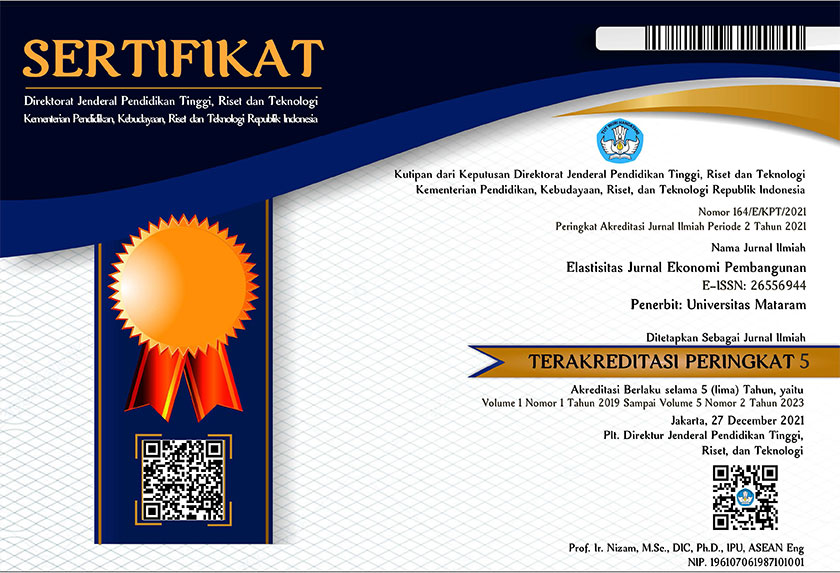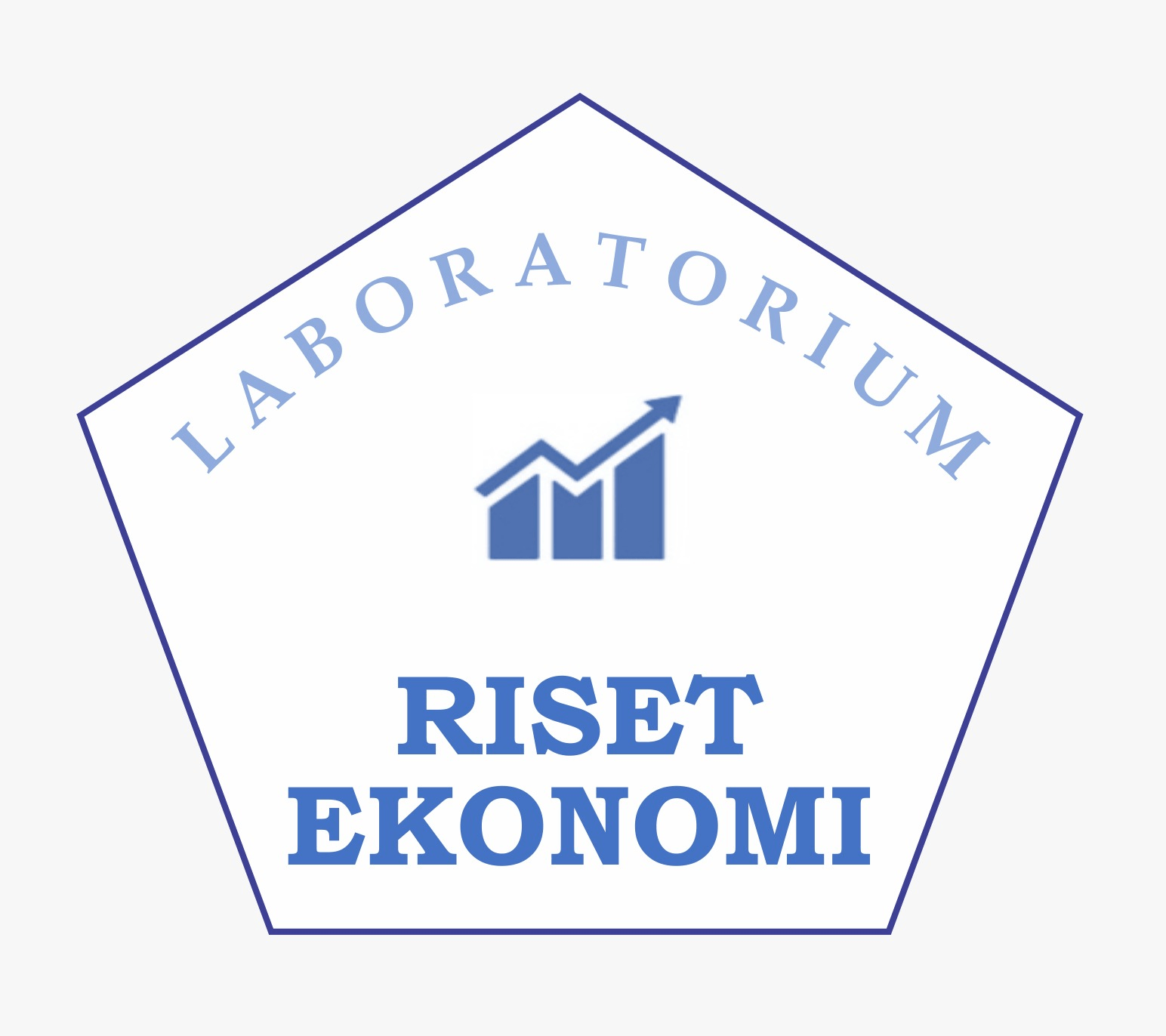INTEGRATED ENTREPRENEURSHIP EDUCATION, ENTREPRENEURSHIP INTENTION AND MULTIDIMENSIONAL POVERTY ALLEVIATION IN WEST JAKARTA
Abstract
Poverty cannot be handled by individuals alone; they must work together with the government, society, and the state. Entrepreneurship is believed to be the driving force of the economy, opening up and creating job opportunities as a solution to poverty alleviation. The aims of this study were to describe the effect of integrated entrepreneurship education on the multidimensional poverty alleviation of housewives in the Krendang area, West Jakarta, mediated by entrepreneurship intention. This area is a densely populated area in Southeast Asia with various limited facilities, located very strategically in a business location. This study uses qualitative and quantitative analysis with a sample of 75 respondents, taken by a purposive sampling technique. The data has been collected and processed using the Structural Equation Model methodology. The findings of this study are, integrated entrepreneurship education has a positive effect on multidimensional poverty alleviation; integrated entrepreneurship education has a positive effect on entrepreneurship intention; entrepreneurship intention has a positive effect on multidimensional poverty alleviation; and integrated entrepreneurship education has a positive effect on multidimensional poverty alleviation indirectly through entrepreneurship intention.
References
Acs, Z., Audretsch, D., & Strom, R. (2009). Entreperenurship, Growth, and Public Policy. New York: Cambridge University Press.
Adekiya, A. A., & Ibrahim, F. (2016). Entrepreneurship intention among students. The antecedent role of culture and entrepreneurship training and development. International Journal of Management Education, 14(2), 116–132. https://doi.org/10.1016/j.ijme.2016.03.001
Akhuemonkhan, I. A., Raimi, L., & Sofoluwe, A. O. (2013). Entrepreneurship Education and Employment Stimulation in Nigeria. Journal of Studies in Social Sciences, 4(1), 1–22. Retrieved from http://infinitypress.info/index.php/jsss/article/view/66
Al Mamun, A., Binti Che Nawi, N., Dewiendren, A. A., & Fazira Binti Shamsudin, S. F. (2016). Examining the Effects of Entrepreneurial Competencies on Students’ Entrepreneurial Intention. Mediterranean Journal of Social Sciences, 7(2), 119–127. https://doi.org/10.5901/mjss.2016.v7n2p119
Ali Hasaballah. Abdel Hafiez and Sheikh Ali, A. Y. (2013). Entrepreneurship Development and Poverty Reduction: Empirical Survey from Somalia. American International Journal of Social Science, 2(3), 108–113.
Chaniago, S. A. (2015). Pemberdayaan Zakat Dalam Mengentaskan Kemiskinan. Journal of Chemical Information and Modeling, 13(1), 47–56.
Ekpoh, U. I., & Edet, A. O. (2011). Entrepreneurship Education and Career Intentions of Tertiary Education Students in Akwa Ibom and Cross River States, Nigeria. International Education Studies, 4(1), 172–178. https://doi.org/10.5539/ies.v4n1p172
Elmuti, D., Khoury, G., & Omran, O. (2012). Does entrepreneurship education have a role in developing entrepreneurial skills and ventures’ effectiveness? Journal of Entrepreneurship Education, 15, 83–98.
Engle, R. L., Dimitriadi, N., Gavidia, J. V., Schlaegel, C., Delanoe, S., Alvarado, I., … Wolff, B. (2010). Entrepreneurial intent: A twelve-country evaluation of Ajzen’s model of planned behavior. Team Performance Management, 16(1–2), 35–57. https://doi.org/10.1108/13552551011020063
Enu, D. B. (2012). Enhancing the Entrepreneurship Education in Nigeria. American Journal of Social Issues and Humanities, 2(4), 232–239.
Estrin, S., Mickiewicz, T., & Stephan, U. (2016). Human capital in social and commercial entrepreneurship. Journal of Business Venturing, 31(4), 449–467. https://doi.org/10.1016/j.jbusvent.2016.05.003
Ezeji, H. A., Ugwoke, E. O., Edeh, N. I., & Okanazu, O. O. (2015). Business
Education: A Tool for Poverty Alleviation in Enugu State. American Journal of Industrial and Business Management, 05(09), 601–609. https://doi.org/10.4236/ajibm.2015.59060
Fayolle, A., Liñán, F., & Moriano, J. A. (2014). Beyond entrepreneurial intentions: values and motivations in entrepreneurship. International Entrepreneurship and Management Journal, 10(4), 679–689. https://doi.org/10.1007/s11365-014-0306-7
Haq, M. B. U., Septiawan, A., & Suhardi, R. M. (2022). Entrepreneurial Motivation Among Economics and Management Students: The Role of Entrepreneurship Education. Jurnal Tatsqif, 20(2), 162-179.
Hattab, H. W. (2014). Impact of Entrepreneurship Education on Entrepreneurial Intentions of University Students in Egypt. Journal of Entrepreneurship, 23(1), 1–18. https://doi.org/10.1177/0971355713513346
Huraerah, A. (2005). Strategi Penanggulangan Kemiskinan. Paradigma Polistaat, 6(2), 168–171.
Hussain, A., & Norashidah, D. (2015). Impact of Entrepreneurial Education on Entrepreneurial Intentions of Pakistani Students. Journal of Entrepreneurship and Business Innovation, 2(1), 43. https://doi.org/10.5296/jebi.v2i1.7534
Ilmi, S. (2017). Konsep Pengentasan Kemiskinan Perspektif Islam. Al –Maslahah, 13(1), 67–84.
Izedonmi, F., & Okafor, C. (2008). Assesment of The Entrepreneurial Characteristics And Intentions Among Academics. IFE Psychologia, 2(Sept 2008), 153–168.
Kadir, M. B. A., Salim, M., & Kamarudin, H. (2012). The Relationship Between Educational Support and Entrepreneurial Intentions in Malaysian Higher Learning Institution. Procedia - Social and Behavioral Sciences, 69(Iceepsy), 2164–2173. https://doi.org/10.1016/j.sbspro.2012.12.182
Keat, O. Y., Selvarajah, C., & Meyer, D. (2011). Inclination towards entrepreneurship among university students : An empirical study of Malaysian university students. International Journal of Business and Social Science, 2(July 2015), 206–220. https://doi.org/10.1016/j.egypro.2012.02.331
Krueger, N. F., Reilly, M. D., & Carsrud, A. L. (2000). Competing models of entrepreneurial intentions. Journal of Business Venturing, 15(5), 411–432. https://doi.org/10.1016/S0883-9026(98)00033-0
Küttim, M., Kallaste, M., Venesaar, U., & Kiis, A. (2014). Entrepreneurship Education at University Level and Students’ Entrepreneurial Intentions. Procedia - Social and Behavioral Sciences, 110, 658–668. https://doi.org/10.1016/j.sbspro.2013.12.910
Lestari, B. R., & Wijaya, T. (2012). Pengaruh Pendidikan Kewirausahaan Terhadap Minat Berwirausaha Mahasiswa di STIE MDP, STMIK MDP, dan STIE MUSI. Forum Bisnis Dan Kewirausahaan Jurnal Ilmiah STIE MDP, (October). https://doi.org/10.31227/osf.io/kejft
Malach, S. E., & Malach, R. L. (2014). Start Your Own Business Assignment in the Context of Experiential Entrepreneurship Education. Journal of Higher Education Outreach and Engagement, 18(1), 182–183.
Malebana, J. (2014). Entrepreneurial intentions of South African rural university students: A test of the theory of planned behaviour. Journal of Economics and Behavioral Studies, 6(2), 130–143. https://doi.org/10.22610/jebs.v6i2.476
Ogundele, O. J. ., Akingbade, W. A., & Akinlabi, H. B. (2012). Entrepreneurship Training and Education As Strategic Tools for Poverty Alleviation in Nigeria. American International Journal of Contemporary Research, 2(1), 148–156.
Packham, G., Jones, P., Miller, C., Pickernell, D., & Thomas, B. (2010). Attitudes towards entrepreneurship education: A comparative analysis. Education + Training, 52(8–9), 568–586. https://doi.org/10.1108/00400911011088926
Powell, B. (2008). Making Poor Nations Rich: Entrepreneurship and the Process of Economic Development. Quart J Austrian Econ, 11(2), 154–158. https://doi.org/10.1007/s12113-008-9041-7
Ramadani, V., Alili, H. A., Dana, L. P., Rexhepi, G., & Ibraimi, S. (2017). The impact of knowledge spillovers and innovation on firm-performance: findings from the Balkans countries. International Entrepreneurship and Management Journal, 13(1), 299–325. https://doi.org/10.1007/s11365-016-0393-8
Raposo, M., & do Paço, A. (2011). Entrepreneurship education: relationship between education and entrepreneurial activity. Psicothema, 23(3), 453–457. Retrieved from http://www.ncbi.nlm.nih.gov/pubmed/21774900
Ras, A. (2013). Pemberdayaan Masyarakat Sebagai Upaya Pengentasan Kemiskinan. Socius, 14(Oktober-Desember), 56–63. https://doi.org/10.21154/cendekia.v11i2.278
Sánchez, J. C. (2013). The impact of an entrepreneurship education program on entrepreneurial competencies and intention. Journal of Small Business Management, 51(3), 447–465. https://doi.org/10.1111/jsbm.12025
Souitaris, V., Zerbinati, S., & Al-Laham, A. (2007). Do entrepreneurship programmes raise entrepreneurial intention of science and engineering students? The effect of learning, inspiration and resources. Journal of Business Venturing, 22(4), 566–591. https://doi.org/10.1016/j.jbusvent.2006.05.002
Syawaluddin, S. (2015). Refleksi Atas Pemikiran Amartya Kumar Sen Tentang Ketimpangan Dan Kemiskinan. Al-Buhuts, 11(1), 1–10. Retrieved from https://www.journal.iaingorontalo.ac.id/index.php/ab/article/view/2060
Urban, B., Van Vuuren, J. J., & Owen, R. H. (2008). Anticedents to entrepreneurial intentions: Testing for measurement invariance for cultural values, attitudes and self-efficacy beliefs across ethnic groups. SA Journal of Human Resource Management, 6(1), 1–9. https://doi.org/10.4102/sajhrm.v6i1.132
Copyright (c) 2023 Ellyana Amran

This work is licensed under a Creative Commons Attribution-ShareAlike 4.0 International License.












